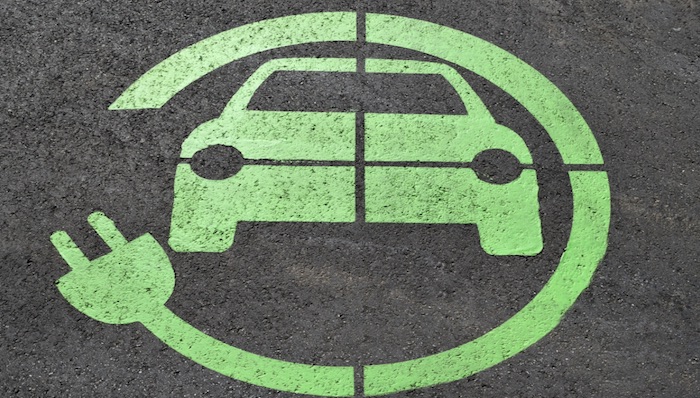
GREEN OR PAY: The latest initiative in Burlington being implemented, and approved by voters, is to have carbon fees attached to the usage of certain transportation or heating methods.
The mayor’s office in Burlington released an announcement on Tuesday outlining the details of how the city anticipates achieving a 100% reduction in carbon emissions in less than a decade in its energy, transportation and heating sectors.
Within the details of the plans are “carbon impact fees,” which will add costs to energy, and that money is then used to subsidize the new technologies like electric heat pumps that weren’t thriving in the free market.
The big announcements included the annual update to the “City’s Net Zero Energy (NZE) Roadmap” that details newly installed electric vehicle charging stations in the parking lot of a community center in the Old North End.
City leaders are enthusiastic that a complete eradication of carbon emissions in seven years is a tangible goal. The release cites new 2022 data provided by Synapse Energy Economics indicating that the city is “ahead of Roadmap pace in the ground transportation sector; natural gas consumption, particularly in the commercial sector.”
Burlington’s overall carbon emissions are down 11.2% compared to 2018.
“What our third annual Net Zero report shows is that local action matters on energy and climate policy, and that we have more work to do to decarbonize Burlington – and when we do, we will realize a cleaner, more affordable, and more vibrant future,” Weinberger said.
He continued, “Parallel to our efforts to make ‘electrifying everything’ as easy and affordable as possible – Burlington has also sought out new regulatory authorities and passed new ordinances aimed at reducing the use of fossil fuels for building heat – the greatest driver of Burlington’s carbon emissions.
“It is through fiscally responsible, well-structured and innovative tactics like these that Burlington has become a national leader in climate action.”
Darren Springer, general manager for the Burlington Electric Department, also commented.
“The 2022 Roadmap update shows both continued progress and a need for more work to be done through policy and customer incentives to further reduce fossil fuel use in Burlington,” he said.
He continued, “We have made great strides in the ground transportation sector and seen firsthand how BED’s electric vehicle rebates combined with fewer vehicle miles traveled are making a difference.”
Carbon Pricing coming soon
Springer said that Burlington residents may soon see “carbon pricing” regarding their carbon emissions.
“Additionally, there are new steps such as implementing the carbon pricing approved on Town Meeting Day, as well as advancing district energy, which would provide the single biggest step we can take toward Net Zero Energy.”
At another point, it is referred to as the “carbon pollution impact fee.”
It states, “The City plans to make significant gains in reducing commercial sector emissions by using local building policies like rental weatherization, new construction renewable heating, a carbon pollution impact fee, and the state’s new Clean Heat Standard.”
Lots of public money
According to the release, there will be lots of public money going towards these green initiatives. It states that “To help make progress toward those goals, in January, BED announced new and expanded electrification incentives for 2023 that, coupled with State of Vermont and Federal Inflation Reduction Act funds, provide significant financial assistance to Burlingtonians when purchasing cold-climate heat pumps, electric vehicles and charging stations, electric lawn care equipment, heat and energy recovery ventilators, and programmable controllers.”
The full press release from the mayor’s office can be viewed online here.
Michael Bielawski is a reporter for True North. Send him news tips at bielawski82@yahoo.com and follow him on Twitter @TrueNorthMikeB.



If “zero carbon emissions” is the goal, then a few common practices must also be eliminated:
1.People must hold their breath and never exhale.
2. Since about18.5% of human body weight is carbon, any and all cremations should be done outside of the city.
3. The use of dry ice (CO2 in solid form) for safely transporting highly perishable items such as organs destined for transplants, frozen foods, etc., should be prohibited.
4. Class B (grease and flammable liquids) or C (electrical) fires must be allowed to burn as they require the use of CO2 fire extinguishers, which would not be allowed in the city, to smother them.
5. No brush fires would be allowed as to prevent the absorbed CO2 of trees and green plants to escape into the atmosphere.
How would all that work for ya, Burlington?
As long as there’s people to rob for the climate hoax they will keep robbing them. The smart businesses will move out along with the residents. Zero emissions does squat on the global climate scene, tt only makes leftist idiots feel like their doing some grandiose thing when in reality they aren’t. Their demise can’t come soon enough.
Weinberger and “city leaders” are both disingenuous and virtue signaling, but the voters in Burlington seem to enjoy the lies.
That a tax on hydrocarbon fuels somehow removes carbon emissions from the atmosphere is a strange notion. The fact is and will remain that natural gas will do the heavy lifting for New England’s power production for decades to come. Burlington’s “city leaders” can move numbers around on paper all they want, but the McNeil plant and acres of solar ain’t going to get the job done.